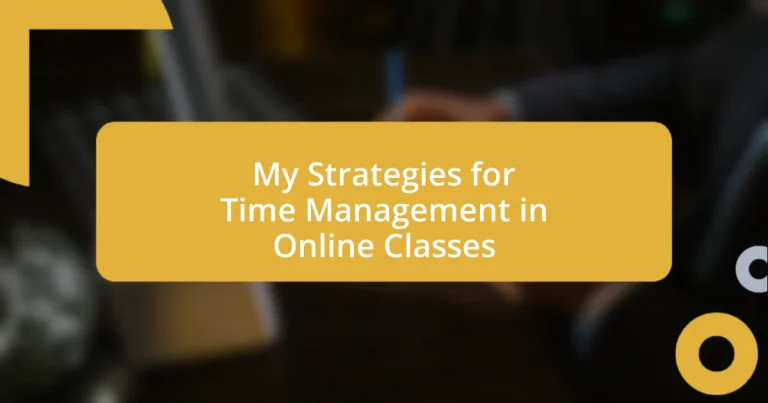Key takeaways:
- Effective time management involves prioritizing tasks, setting specific time blocks, and utilizing planning tools to enhance productivity and reduce stress.
- Setting clear academic goals and adopting the SMART criteria helps in breaking down objectives, tracking progress, and maintaining motivation throughout online courses.
- Regularly evaluating and adjusting study strategies, incorporating varied techniques, and seeking feedback can lead to improved focus, engagement, and overall learning outcomes.
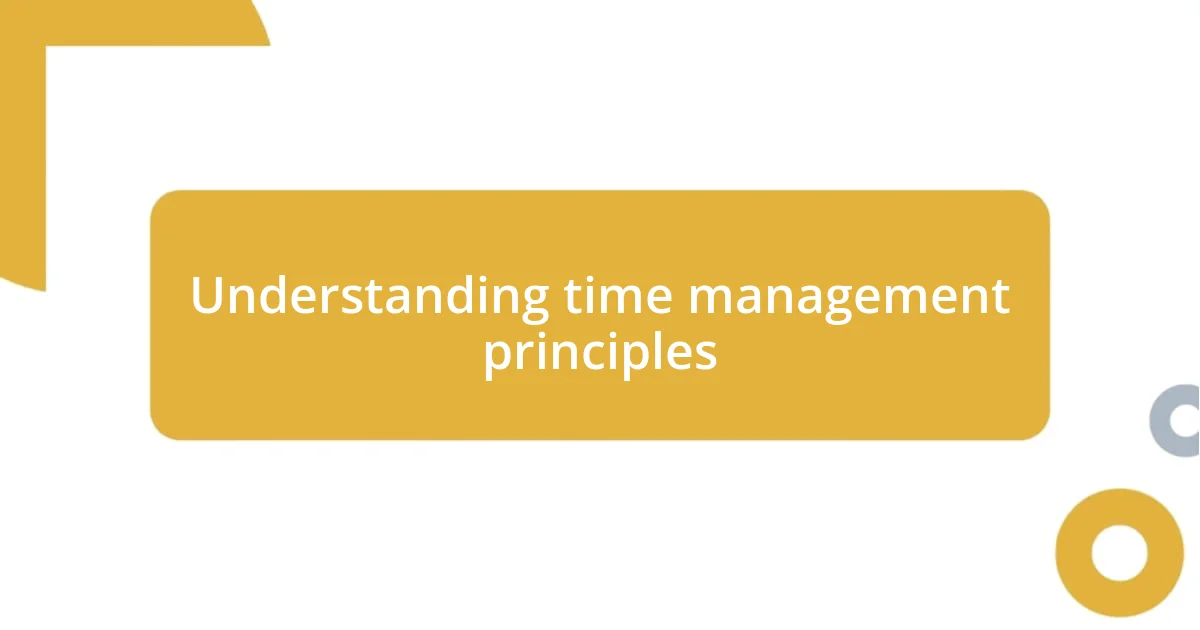
Understanding time management principles
Time management is all about prioritizing tasks and understanding how much time each demands. I remember a particularly overwhelming week during my online classes when I’d piled on assignments, yet I achieved so much by simply listing my tasks in order of urgency. Have you ever felt swamped by deadlines? Recognizing which tasks require immediate attention can dramatically shift your productivity levels.
Another fundamental principle is setting specific time blocks for studying or completing assignments. I once experimented with the Pomodoro Technique, working in focused bursts of 25 minutes, followed by brief breaks. It might sound simple, but those short intervals kept me engaged and less fatigued. How do you usually tackle lengthy study sessions? By breaking down your time, you can maintain sharper focus and retain more information.
Lastly, it’s essential to leverage tools and resources that can aid in managing your time effectively. Early on, I found a digital planner that helped me visualize my commitments. It was a game-changer! Have you tried using a planner or an app to track your tasks? These tools not only keep you organized but can also ease the stress of juggling multiple responsibilities, allowing you to approach your studies with clarity and confidence.
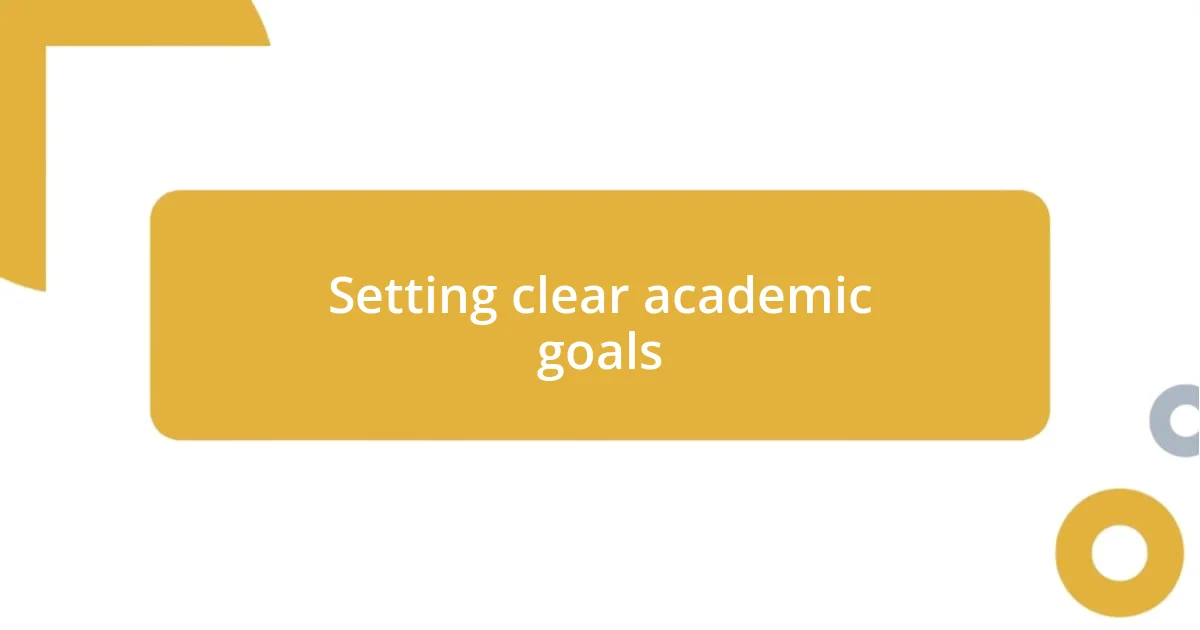
Setting clear academic goals
Setting clear academic goals is crucial for navigating the often chaotic world of online classes. When I first started my online education, I was bombarded with materials and assignments, which felt daunting. Breaking down my objectives into clear, actionable goals helped me focus my energy. Without specific targets, I found myself wandering through my coursework, rather than making actual progress. Setting SMART goals—Specific, Measurable, Achievable, Relevant, and Time-bound—turned my ambitions into a structured plan I could follow.
To sharpen your focus on setting academic goals, consider these steps:
- Define Your Purpose: What do you want to achieve this semester? Be specific.
- Break Down Long-Term Goals: Divide them into manageable short-term objectives.
- Track Your Progress: Use tools that help you visualize your achievements, like a goal tracker or journal.
- Stay Flexible: Adjust your goals as needed. Life can throw curves, and that’s okay!
- Celebrate Small Wins: Recognize and reward yourself for reaching milestones—it makes the journey enjoyable!
By incorporating these practices into my routine, I noticed a marked difference in my motivation and performance. Each time I crossed off a goal, I felt a surge of accomplishment that pushed me forward. Have you felt that rush? It’s incredibly empowering!
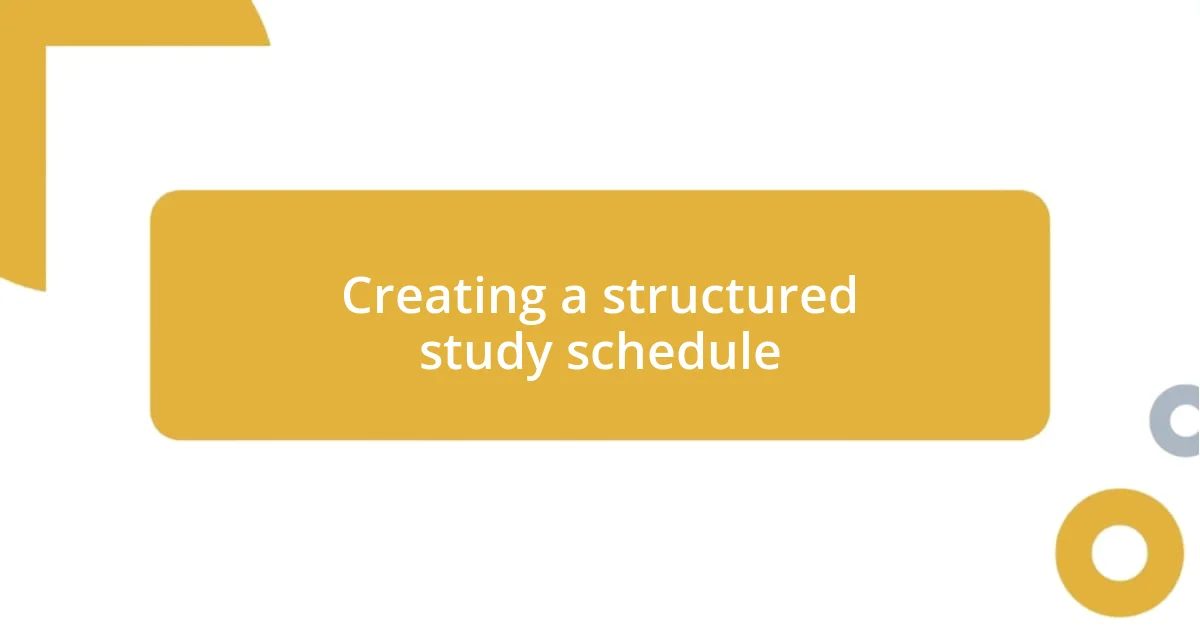
Creating a structured study schedule
Creating a structured study schedule can significantly enhance your focus and efficiency in online classes. I recall drafting my first study schedule, feeling both excited and apprehensive. By allocating specific time slots for each subject and sticking to that plan, I not only kept my stress levels in check, but I also found that I felt a sense of achievement each time I completed a study block. Has a structured approach ever helped you stay on track? It’s amazing how such a simple strategy can transform your study habits.
When designing your study schedule, make sure to account for variety. I’ve learned that incorporating different subjects and types of assignments can keep me engaged and motivated. For instance, I often alternate between reading materials, watching lectures, and working on projects. This mix not only prevents burnout but also makes the learning experience more dynamic and enjoyable. Do you find yourself zoning out during long study sessions? I can definitely relate, which is why variety became essential in my routine.
Moreover, be realistic about your time. Early on, I filled my schedule with ambitious goals, only to feel overwhelmed. Adjusting my expectations to fit within my actual available time led to smoother, more productive study sessions. I encourage you to consider your own pace and commitments when creating a schedule. A flexible yet structured approach can be a perfect blend to unlock your potential. How did you adjust your studying approach to fit your lifestyle?
| Key Factors | Personal Experience |
|---|---|
| Structured Time Blocks | Helped me reduce stress and achieve daily goals. |
| Variety in Subjects | Keeps my focus sharper and learning experience fresh. |
| Realistic Time Management | Prevented overwhelm, allowing for a more enjoyable study routine. |
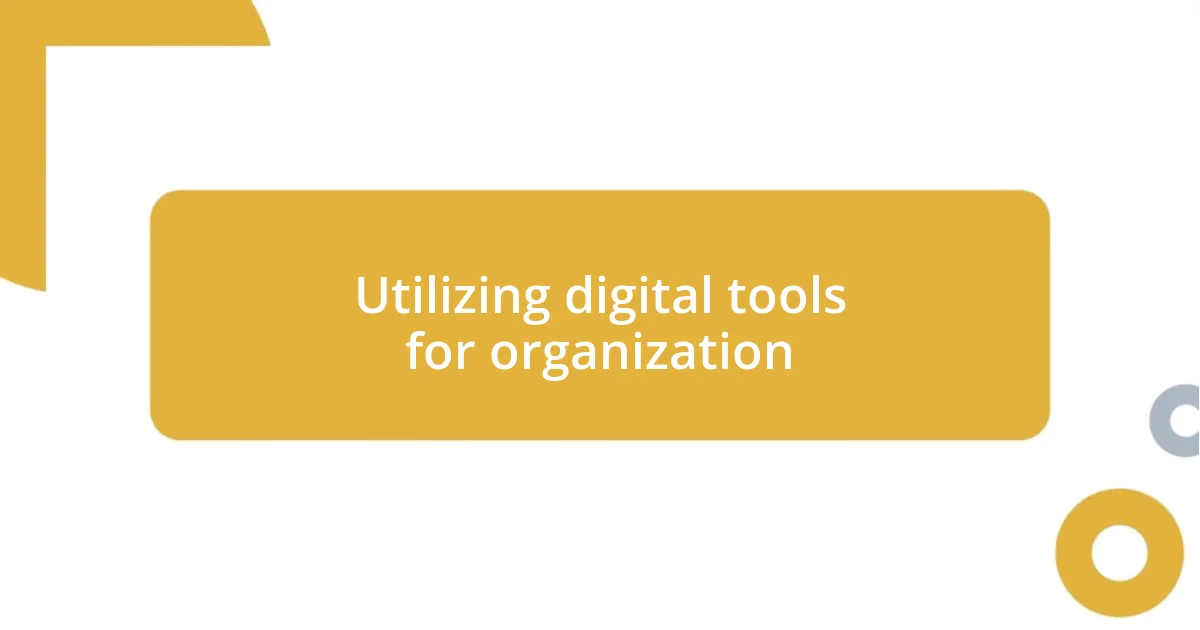
Utilizing digital tools for organization
Utilizing digital tools for organization has made a world of difference in my online learning experience. I remember the early days of my online classes, where information seemed to spiral out of control. Tools like Trello and Notion became my lifelines. By setting up boards and lists, I could visually organize assignments and track deadlines. Have you ever experienced that delightful moment when everything falls into place on a digital board? It’s incredibly satisfying!
One of my favorite methods is using Google Calendar. It allows me to block off specific study times and set reminders for upcoming deadlines. I’ve learned to color-code my classes, which not only helps me stay organized but also makes my calendar visually appealing. Whenever I see those vibrant colors, I feel a sense of control over my schedule. Has using a digital planner ever motivated you to stick to your plans? For me, seeing my commitments laid out clearly transforms my outlook and helps keep procrastination at bay.
Document storage apps like Google Drive have also been crucial for maintaining my organizational flow. I categorize materials by subject and date, ensuring easy access whenever I study. There’s a sense of peace in knowing that all my notes, assignments, and readings are just a click away. I often ask myself, “How did I ever manage without this?” Having everything organized digitally has not only saved me time but it has also reduced the stress that comes with sifting through piles of paper or scattered files on my desktop. What tools do you rely on to help keep your academic life organized?
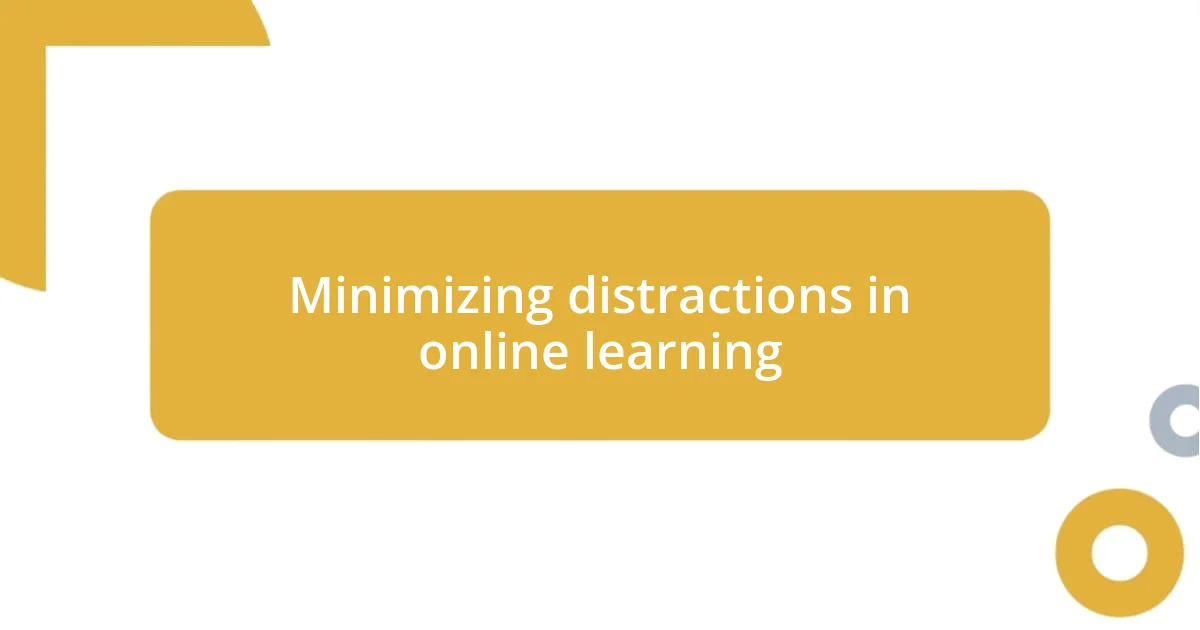
Minimizing distractions in online learning
Minimizing distractions in online learning is crucial for maintaining focus and productivity. I remember the first few weeks of my online classes when I would find myself tempted to scroll through social media mid-lecture. To combat this, I made it a habit to silence notifications and put my phone out of reach. Just by implementing this small change, I felt more engaged and present in my classes. Have you ever noticed how easy it is to lose track of time when distractions are nearby?
I also found that creating a designated study space significantly reduced my distractions. I transformed a corner of my room into a focused environment, complete with a comfortable chair and good lighting. Initially, I thought I could study anywhere, but I quickly realized that a specific space helped my brain associate that area with concentrating. Have you established a study zone? I genuinely believe that where you study can impact how well you retain information.
Lastly, I’ve learned to incorporate short breaks into my study sessions. This practice not only helps refresh my mind but also keeps the distractions at bay. I often set a timer for 25 minutes of focused work followed by a five-minute break. During that break, I step away from my desk, grabbing a quick snack or stretching a bit. It’s refreshing to break the cycle and return to my studies with renewed energy. What strategies have you found effective for keeping your focus during online learning?
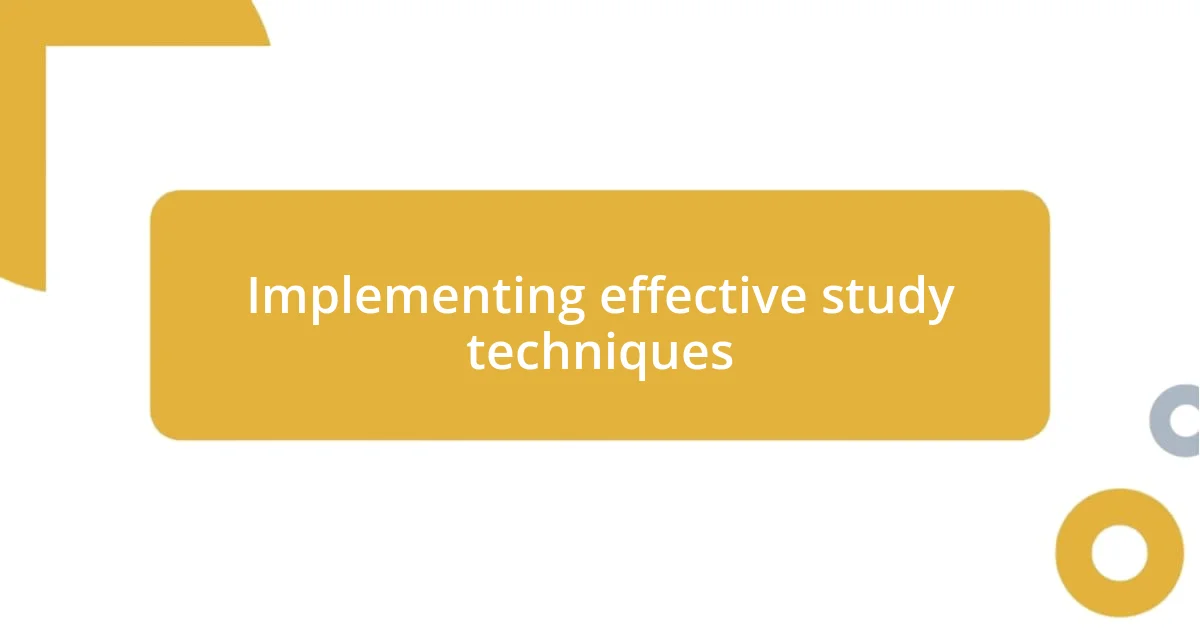
Implementing effective study techniques
One technique that I’ve found instrumental in my studies is the Feynman Technique. This method involves teaching a concept back to yourself as if you were explaining it to someone else. I remember grappling with complex theories in my courses; once I started summarizing these theories aloud to an imaginary audience, everything clicked. Have you ever tried explaining something you learned? It’s remarkable how teaching reveals gaps in your understanding and solidifies your knowledge.
Another effective strategy involves using active recall. Instead of passively reviewing notes, I challenge myself with flashcards or practice quizzes. I recall the moment I faced a tough exam, and I realized that actively retrieving information helped it stick in my mind. When I look back, I can hardly believe how much more confidently I could answer questions. Have you ever felt that rush of clarity when you finally connect the dots? Using active recall not only boosts memory retention but also builds confidence in what I’ve learned.
Lastly, I emphasize the importance of varied study techniques. I’ve discovered that mixing reading, videos, and hands-on projects keeps me engaged and caters to different learning styles. Journaling about what I’ve studied has become a cherished part of my routine; it allows me to reflect and connect emotionally with the material. What types of study methods keep your enthusiasm alive? I find that embracing variety keeps me on my toes and ensures I remain excited about my online classes.
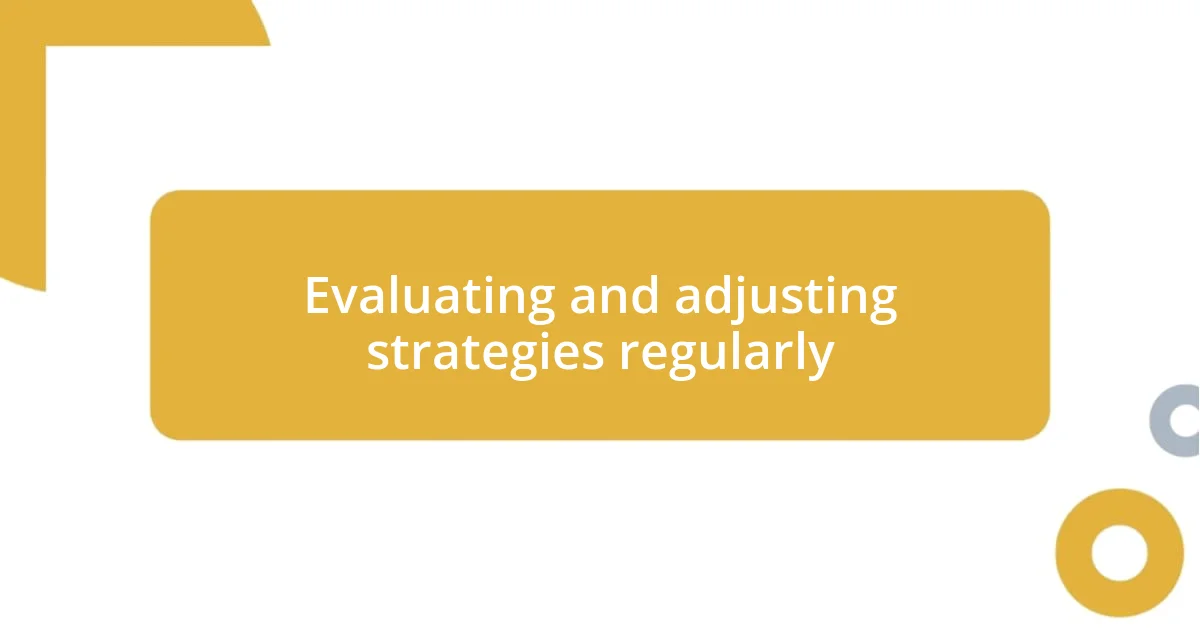
Evaluating and adjusting strategies regularly
It’s essential to regularly evaluate and adjust your time management strategies in online classes. I’ve learned that what works one semester might not work the next. For instance, I remember sticking to a rigid schedule that quickly became overwhelming. When I took a step back to assess my approach, I realized I needed more flexibility. Have you ever felt bound by a plan that didn’t serve you well? Adjusting my schedule allowed me to find a rhythm that felt more aligned with my energy levels and learning style.
I also make it a point to track my progress, which has been eye-opening. One semester, I noticed I was spending too much time on certain subjects while neglecting others. When I regularly assessed my efforts, it became clear that I needed to redistribute my focus. I started using a simple chart to visualize where my time was going—it was a game-changer! Have you tried visually mapping your study time? It’s fascinating how visual cues can lead to significant shifts in productivity.
Lastly, I believe in the power of feedback, both from my peers and myself. I often reach out to classmates to gauge how they manage their time effectively. Hearing about their strategies not only inspires me but also prompts me to reconsider my own. Plus, at the end of each week, I reflect on what strategies helped or hindered my progress. It’s a bit of a self-exploration process—almost like a mini-review of my study life. How often do you take the time to reflect on your strategies? I find that these modest evaluations can lead to meaningful adjustments that enhance my overall learning experience.












